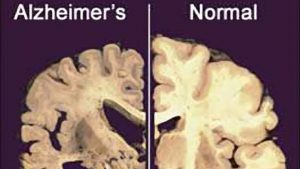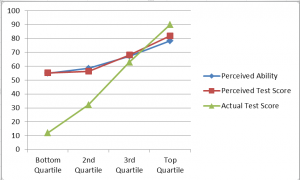Mar
02
2018
 Most people have had the common experience of feeling as if we have been someplace before, or that events that are occurring in real time have happened before. Sometimes we feel as if we know what is going to happen next – and then it happens. Unsurprisingly some have interpreted these phenomena as evidence for some type of extrasensory perception. Something weird certainly seems to be going on.
Most people have had the common experience of feeling as if we have been someplace before, or that events that are occurring in real time have happened before. Sometimes we feel as if we know what is going to happen next – and then it happens. Unsurprisingly some have interpreted these phenomena as evidence for some type of extrasensory perception. Something weird certainly seems to be going on.
Neuroscientists have been extremely successful in at least partially explaining many such weird experiences. What is uncanny is that our experience of reality is a constructed illusion, and occasionally we experience the glitches in this construction. The most obvious examples of this are optical illusions. We marvel at how our visual construction can be deceived, or can flip between different states.
But everything, not just vision, is a similarly artificial neurological construction subject to illusory effects. That includes memory.
That déjà vu is a memory glitch is old news. But neuroscientists have been teasing apart the phenomenon in more detail, revealing some aspects of how our memories work. A recent study adds another bit of information to our understanding, which we can use as a jumping off point to review what we know.
Anne Cleary, a cognitive psychologist at Colorado State University, has been researching déjà vu and related phenomena. She believes that déjà vu is a manifestation of a memory phenomenon known as familiarity.
Continue Reading »
Mar
09
2017
 A recent article in The Mercury News reports on the work of a neurosurgeon who is injecting fat-derived stem cells into the brains of Alzheimer’s patients. The reports is, unfortunately, typical. It revolves around a heart-wrenching anecdote, while giving the facts with the usual false balance.
A recent article in The Mercury News reports on the work of a neurosurgeon who is injecting fat-derived stem cells into the brains of Alzheimer’s patients. The reports is, unfortunately, typical. It revolves around a heart-wrenching anecdote, while giving the facts with the usual false balance.
This is the perfect storm for dubious treatments – Alzheimer’s disease (AD) is a progressive dementia that causes sufferers to slowly lose their memories and ability to think. It is a growing problem with our aging population. There are some modest symptomatic treatments for AD but nothing which alters the course of the disease, or can stop or reverse it.
There is no doubt that the need for an effective treatment is great, but that does not justify lower the standards of science in medicine. If anything it means we have to be more careful.
Added to this is the hype and allure of stem cells, which are progenitor cells that can turn into specific cell types. The general idea with stem cell therapy is that the stem cells will replace damaged or dying cells, repair organs, and reverse disease. This is tricky technology, however, and as is common the hype is running ahead of the science. That is a recipe for exploitation and quackery. Fake stem cell clinics have popped up around the world, promising cures but just robbing the desperate of their remaining health and large amounts of money.
Continue Reading »
Apr
02
2015
 When I was an intern doing a rotation in the emergency department, on one particularly busy shift a nurse commented (to no one in particular) that it must be a full moon. I habitually look at the moon and generally know what phase it is in (right now it is a waxing gibbous, almost full), and so I knew at the time that in fact there was a crescent moon in the sky. I informed her of this. She gave a disappointed look and then went on with her work without any apparent further thought on the matter.
When I was an intern doing a rotation in the emergency department, on one particularly busy shift a nurse commented (to no one in particular) that it must be a full moon. I habitually look at the moon and generally know what phase it is in (right now it is a waxing gibbous, almost full), and so I knew at the time that in fact there was a crescent moon in the sky. I informed her of this. She gave a disappointed look and then went on with her work without any apparent further thought on the matter.
The episode struck me at the time. It seemed to me that I just witnessed a clear example of confirmation bias – what if it had been near a full moon? That would have confirmed her prior belief in a lunar effect, while this negative correlation was brushed aside and likely did not have any negative effect on her belief. (Although, my interpretation and memory of this event can itself be an example of confirmation bias regarding confirmation bias.)
Belief in the so-called lunar effect, that the phases of the moon exert an influence on human behavior with the most common element being a full-moon inducing extreme behavior, is very common. In my experience it is one of the most common pseudoscientific beliefs I encounter in the general public. One survey indicates that 43% of adults believe in the lunar effect, especially mental health professionals, including nurses.
When someone expresses such a belief to me I often use it as an opening to discuss skeptical principles. While belief in the lunar effect is widespread, it is usually not part of any emotionally held religious or ideological belief. It is therefore an excellent teaching opportunity. One question I like to ask is, “how do you think that works?” The most common answer I receive is probably the least plausible – that the tidal effects of the moon influence the brain because the brain is sitting in water (spinal fluid).
Continue Reading »
Feb
06
2015
 Memory is a slippery thing. We know from countless psychological studies that memories can easily be fabricated, they will alter over time, and details will shift to enhance the emotional theme of the story. Further, we tend to personalize stories – over time we remember events that happened to our friends as happening to us.
Memory is a slippery thing. We know from countless psychological studies that memories can easily be fabricated, they will alter over time, and details will shift to enhance the emotional theme of the story. Further, we tend to personalize stories – over time we remember events that happened to our friends as happening to us.
Recently NBC host Brian Williams was caught telling a version of an event that happened 12 years ago that differs from the version others recall, and the version that he himself told at the time. He and his cameraman were in a helicopter group during the Iraqi war in 2003. The leading three helicopters, which were 30-60 minutes ahead, were forced to land upon taking small arms fire, with one copter being hit by an RPG. Williams’ copter also landed when they arrived at the lead group in order to avoid being fired on. The group had to be rescued by ground troops and tanks.
The problem is that Williams’ retelling of this story has shifted a bit over the years, until in the last couple of years he puts himself in the helicopter that was hit by fire. Stars and Stripes gives the timeline of this shifting story. So what’s going on here.
Continue Reading »
Dec
18
2014
Egnor continues his dualist neuroscience denial in two follow up posts, mostly responding to PZ Myers’ take down of his original post. Egnor has also been writing separately about computers, arguing that they have no memory and will never be intelligent (have agency).
In all of these posts Egnor is following the same basic intellectual strategies – use words in a vague and confusing way to befuddle your reader, and assume your conclusion (dualism). Ironically, he writes:
The contemporary criticism of such phrases as “memory is stored in the brain” and “the brain evaluates propositions” and “the occipital cortex perceives images” — criticism made by neuroscientists and philosophers like Maxwell Bennett and Peter Hacker among others — is in keeping with the salient critiques by ordinary language philosophers who insist that we need to be honest and careful with the meanings of words in our scientific discourse. Ordinary language philosophy in neuroscience is an appeal to conceptual hygiene.
The projection is truly amazing. Science denial is pseudoskepticism – all of the form with none of the actual substance.
Continue Reading »
Nov
06
2014
 In 1999 psychologist David Dunning and his graduate student Justin Kruger published a paper in which they describe what has come to be known (appropriately) as the Dunning-Kruger effect. In a recent article discussing his now famous paper, Dunning summarizes the effect as:
In 1999 psychologist David Dunning and his graduate student Justin Kruger published a paper in which they describe what has come to be known (appropriately) as the Dunning-Kruger effect. In a recent article discussing his now famous paper, Dunning summarizes the effect as:
“…incompetent people do not recognize—scratch that, cannot recognize—just how incompetent they are,”
He further explains:
“What’s curious is that, in many cases, incompetence does not leave people disoriented, perplexed, or cautious. Instead, the incompetent are often blessed with an inappropriate confidence, buoyed by something that feels to them like knowledge.”
As you can see in the chart above, the most competent individuals tend to underestimate their relative ability a little, but for most people (the bottom 75%) they increasingly overestimate their ability, and everyone thinks they are above average. I sometimes hear the effect incorrectly described as, “the more incompetent you are, the more knowledgeable you think you are.” As you can see, self-estimates do decrease with decreasing knowledge, but the gap between performance and self-assessment increase as you decrease in performance.
Continue Reading »
Apr
22
2014
I have had the following experience many times, and so I suspect that it is a near-universal experience. You are in a heated conversation with one or more other people who have differing opinions on the topic of discussion. Perhaps it’s just a fight over personal matters. After the heat has died down and calmer emotions prevail, you try to come to some sort of resolution about the prior conversation. Such efforts, however, are complicated by the fact that everyone has a very different memory of the conversation you just shared.
A related experience that is also common occurs when discussing a topic about which there is disagreement (such as politics), and then revisiting the topic weeks or months later. Again, everyone has a different memory of the prior discussion, including which facts were established. It’s almost as if the previous conversation had not taken place.
It’s as if everyone edits their memories to fit their existing narrative. In this way, memory can be a very dangerous thing – it gives us a false confidence in our current beliefs and attitudes. We believe the facts support our position. However, we often choose our facts based on our narrative, rather than craft a narrative based upon facts.
We tend to easily see this process in others, but of course often fail to see it in ourselves.
Continue Reading »
Mar
17
2014
A man is in an extended coma after a traumatic injury. When he finally awakes from his coma he finds that he has brought something back with him from the darkness – psychic powers. Yes, this is the plot of the 1983 Stephen King movie, The Dead Zone. It is also the alleged story of a 23 year old Southend student named Rob Ball.
Ball was assaulted and hit in the side of the head resulting in a two week coma. He had significant brain injury, and after waking from the coma he suffered from significant memory loss and needed extensive physical therapy in order to walk. Describing his injuries, he said:
“It feels like my head is going to blow up and I’m convinced I’m going to die all the time now, because it’s had such an impact on my life. I get deja vu all the time. I don’t know if it’s something to do with the head injury, but I keep thinking ‘I remember this before’, and think something is about to go wrong.”
Memory loss and headaches are typical symptoms of a traumatic brain injury. The deja vu is an interesting symptom – this is the phenomenon of feeling as if a current experience is familiar, as if it has happened before. We do not yet fully understand the neuroanatomical correlates and functional causes of deja vu, but we have some fairly compelling leads.
Continue Reading »
Feb
07
2014
There has been a lot of discussion about the Bill Nye-Ken Ham creationism debate from the other night. Questions about whether or not the debate was a good idea, and who won, are probably too overwhelmed with subjectivity for there to be any definitive answer. We talked about it on the SGU this week so you can listen to the next show to hear my thoughts.
One sideshow that emerged from the debate that I do want to talk about came from journalist Matt Stopera. He reports:
I asked 22 self-identifying creationists at the Bill Nye/Ken Ham debate to write a message/question/note to the other side. Here’s what they wrote.
Take a look at the 22 photos – this is not a scientific survey by any means, but probably does reveal something about what the “rank and file” creationist on the street believes. I thought it would be fun to actually answer the 22 questions, since there are likely to be many creationists out there who believe the same sorts of things.
Continue Reading »
Sep
23
2013
The most astounding sensory illusions occur by exploiting brain processes you are not aware even exist, or need to exist. Definitely in the running for the best such illusion are body ownership experiments. Your brain uses sensory information to decide which parts of your body you own, control, and where they are in three-dimensional space. This process can be easily fooled into creating an alternate image – making you feel as if you own and control fake body parts, and even virtual avatars.
Various researchers have consistently shown this basic effect, while they explore the details and limits of this phenomenon. One such experiment, published today in the Journal of Physiology, adds a few new details to the picture.
Researchers had subjects hold an artificial finger in their left hand. They then had them flex their right index finger, while the artificial finger also flexed itself. They were blocked from seeing their hands, and the skin of their right hand was numbed with medication. Subjects then reported that they were holding their right index finger.
Continue Reading »
 Most people have had the common experience of feeling as if we have been someplace before, or that events that are occurring in real time have happened before. Sometimes we feel as if we know what is going to happen next – and then it happens. Unsurprisingly some have interpreted these phenomena as evidence for some type of extrasensory perception. Something weird certainly seems to be going on.
Most people have had the common experience of feeling as if we have been someplace before, or that events that are occurring in real time have happened before. Sometimes we feel as if we know what is going to happen next – and then it happens. Unsurprisingly some have interpreted these phenomena as evidence for some type of extrasensory perception. Something weird certainly seems to be going on.
 A recent article in The Mercury News
A recent article in The Mercury News







